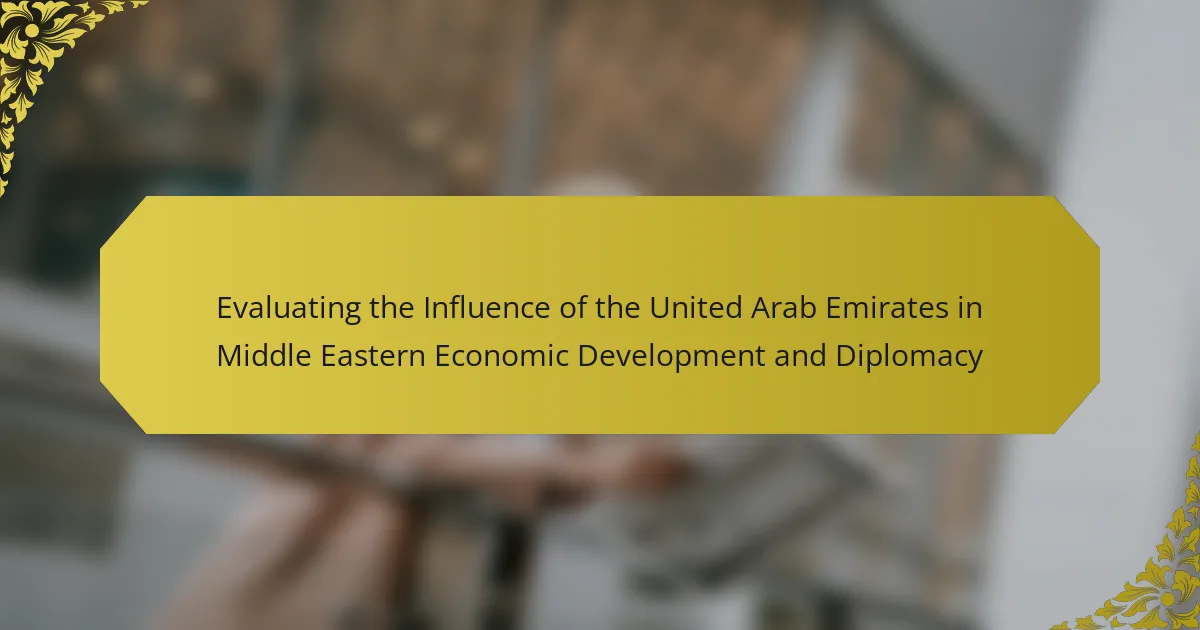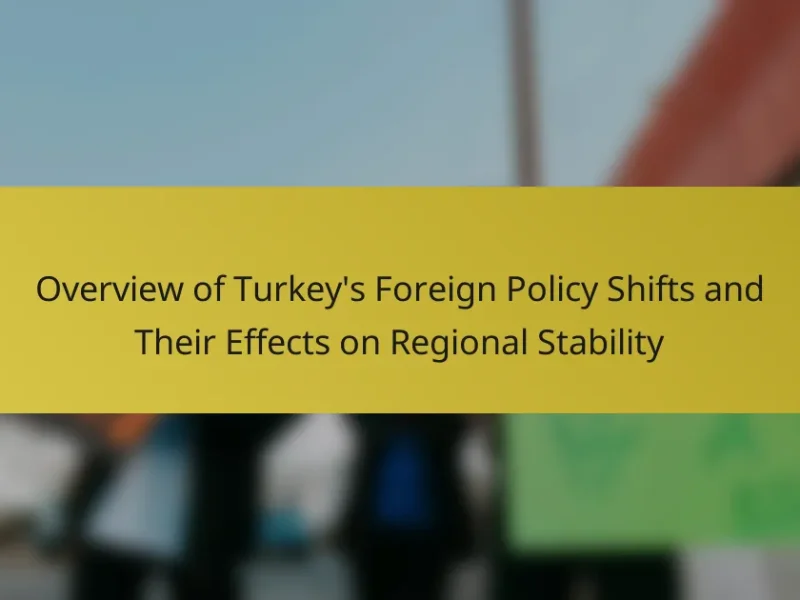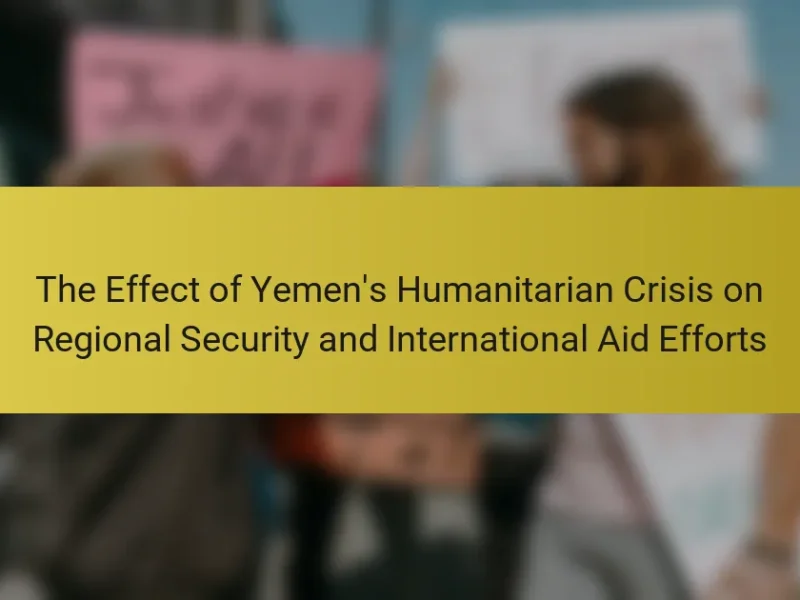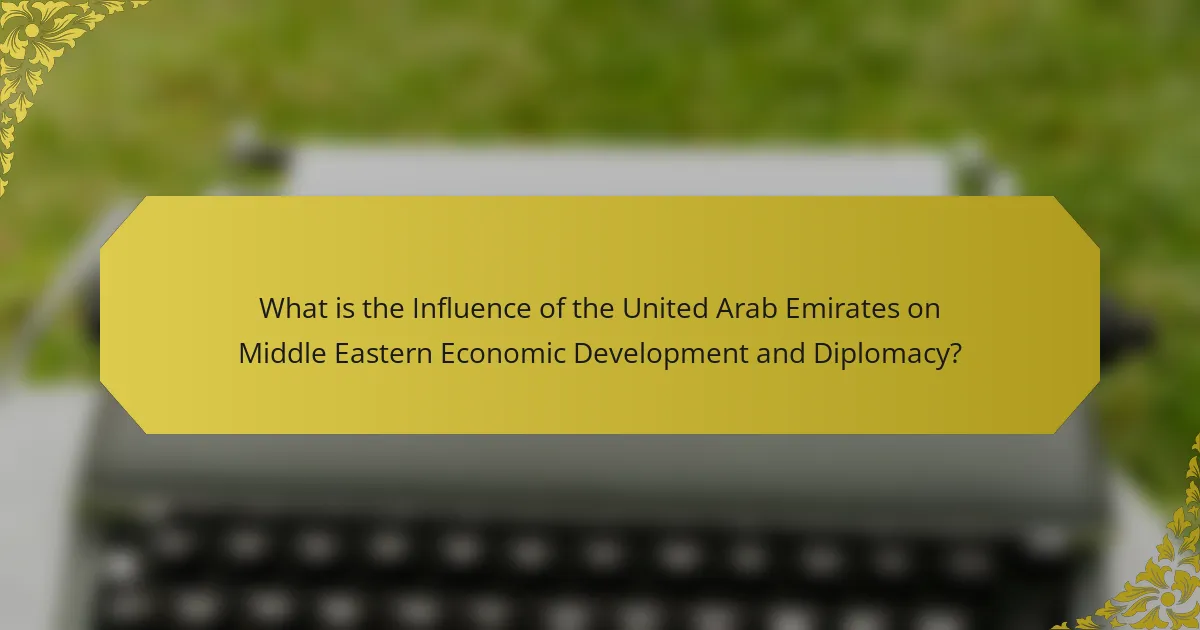
What is the Influence of the United Arab Emirates on Middle Eastern Economic Development and Diplomacy?
The United Arab Emirates (UAE) significantly influences Middle Eastern economic development and diplomacy. Its economic diversification strategy has positioned it as a regional hub for trade and investment. The UAE’s GDP reached approximately $421 billion in 2021, showcasing its economic strength. The country invests heavily in infrastructure, technology, and renewable energy, fostering regional economic growth.
Diplomatically, the UAE plays a key role in fostering stability and cooperation in the region. It has established strategic partnerships with countries like Saudi Arabia and Bahrain, enhancing collective regional security. The UAE’s involvement in the Abraham Accords illustrates its commitment to peace and normalization of relations with Israel, impacting regional dynamics.
Furthermore, the UAE’s foreign aid initiatives, amounting to over $30 billion in recent years, support economic development in various Middle Eastern nations. This aid strengthens diplomatic ties and promotes regional stability. Overall, the UAE’s economic strategies and diplomatic efforts are pivotal in shaping the future of the Middle East.
How has the UAE’s economic growth impacted the region?
The UAE’s economic growth has significantly influenced the region’s development and stability. This growth has led to increased foreign investments in neighboring countries. The UAE’s diversified economy serves as a model for economic reform in the Middle East. Additionally, the UAE has become a hub for trade and tourism, boosting regional economies. Infrastructure projects in the UAE often spur similar initiatives in surrounding nations. The UAE’s economic success has fostered stronger diplomatic ties with other countries. This growth has also elevated the UAE’s role in global economic forums. Consequently, the UAE’s economic expansion contributes to regional collaboration and shared prosperity.
What are the key economic sectors driving the UAE’s influence?
The key economic sectors driving the UAE’s influence are oil and gas, tourism, aviation, and finance. Oil and gas significantly contribute to the UAE’s GDP, accounting for about 30% of the economy. The UAE is one of the world’s largest oil producers, with proven reserves of approximately 97.8 billion barrels. Tourism has also become a major sector, attracting over 16 million visitors in 2019, contributing to economic diversification. The aviation industry is vital, with Dubai International Airport being one of the busiest airports globally. Additionally, the financial sector, particularly in Dubai, hosts numerous international banks and financial institutions. These sectors collectively enhance the UAE’s economic stature and geopolitical influence in the region.
How does the UAE’s GDP compare to other Middle Eastern countries?
The UAE has one of the highest GDPs in the Middle East. As of 2023, its GDP is approximately $501 billion. This positions the UAE as the second-largest economy in the region, following Saudi Arabia. The UAE’s GDP per capita is also among the highest globally, reflecting its wealth. In comparison, Saudi Arabia’s GDP stands at about $1 trillion. Other countries like Qatar and Kuwait have GDPs of around $223 billion and $85 billion, respectively. The UAE’s diverse economy, driven by sectors like tourism and finance, contributes to its strong economic standing.
What diplomatic strategies does the UAE employ in the region?
The UAE employs a range of diplomatic strategies in the region, focusing on economic partnerships, soft power, and multilateralism. Economic partnerships are central to its approach, fostering trade agreements and investment initiatives with neighboring countries. The UAE uses soft power by promoting cultural diplomacy, hosting international events, and engaging in humanitarian efforts. It actively participates in multilateral organizations, strengthening its influence through collaborative frameworks. The UAE also engages in conflict mediation, aiming to stabilize regional tensions. Its diplomatic strategies are evident in initiatives like the Abraham Accords, which normalized relations with Israel. These strategies enhance the UAE’s role as a key player in Middle Eastern diplomacy.
How does the UAE engage with neighboring countries?
The UAE engages with neighboring countries through diplomatic initiatives and economic partnerships. It actively participates in regional organizations like the Gulf Cooperation Council (GCC). The UAE promotes trade agreements to enhance economic ties. It invests in infrastructure projects across the region, fostering mutual development. The UAE also collaborates on security matters to address regional threats. Bilateral agreements with countries like Saudi Arabia and Oman strengthen political relations. Cultural exchanges further enhance understanding and cooperation. The UAE’s foreign aid initiatives support development in neighboring countries, reinforcing its role as a regional leader.
What role does the UAE play in regional organizations?
The UAE plays a pivotal role in regional organizations. It is a key member of the Gulf Cooperation Council (GCC), promoting economic and political collaboration. The UAE also engages actively in the Arab League, contributing to regional stability and security initiatives. Additionally, it participates in the Organization of Islamic Cooperation (OIC), advocating for Muslim unity and cooperation. The UAE’s investments in regional infrastructure projects further enhance its influence. Its diplomatic efforts often mediate conflicts within the region. The UAE’s strategic partnerships bolster collective security measures among member states. Overall, its involvement fosters economic integration and political dialogue in the Middle East.
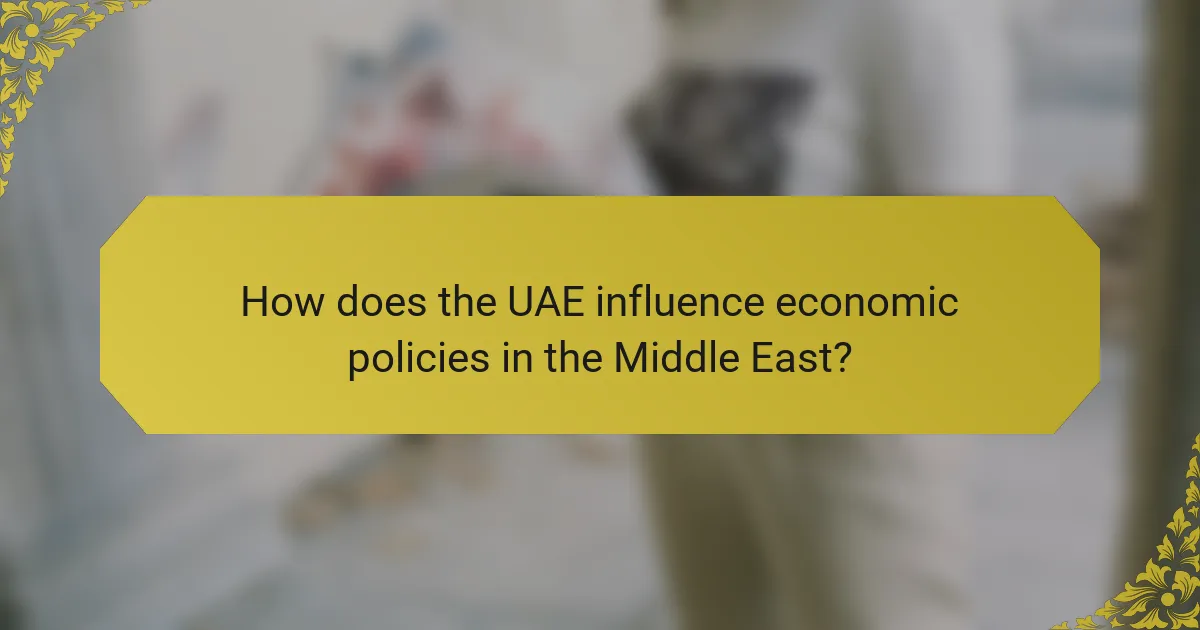
How does the UAE influence economic policies in the Middle East?
The UAE influences economic policies in the Middle East through strategic investments and partnerships. It uses its wealth from oil revenues to invest in infrastructure and development projects across the region. These investments often lead to economic reforms in partner countries. The UAE also promotes free trade agreements that enhance regional economic collaboration. Its economic model serves as a benchmark for other countries, encouraging modernization and diversification. The UAE’s leadership in hosting international business forums fosters dialogue on economic policy. Additionally, it engages in diplomatic efforts that align economic interests with political stability. Through these actions, the UAE plays a pivotal role in shaping economic policies in the Middle East.
What are the UAE’s main economic partnerships?
The UAE’s main economic partnerships include agreements with countries such as India, China, and the United States. India is a key trading partner, with bilateral trade reaching approximately $60 billion in 2020. China is another significant partner, with trade volumes exceeding $50 billion in recent years. The UAE also has a strong economic relationship with the United States, which includes a trade agreement valued at around $27 billion. Additionally, the UAE engages in partnerships within the Gulf Cooperation Council (GCC), enhancing regional trade and investment. These partnerships are vital for the UAE’s economic diversification and growth strategy.
Which countries are key trading partners of the UAE?
China, India, and the United States are key trading partners of the UAE. In 2022, China was the UAE’s largest trading partner, with trade volume exceeding $60 billion. India ranks second, with bilateral trade reaching approximately $45 billion. The United States follows closely, with trade valued at around $25 billion. Other significant partners include Saudi Arabia and Japan. These countries contribute to the UAE’s strategic position in global trade networks. The UAE’s diverse economy benefits from these partnerships, enhancing its influence in the region.
How do these partnerships benefit the UAE’s economic standing?
Partnerships enhance the UAE’s economic standing by attracting foreign investment. These collaborations create a favorable business environment. They facilitate trade agreements that increase export opportunities. Additionally, partnerships foster innovation through knowledge transfer. The UAE’s strategic location as a trade hub is reinforced. Economic diversification is supported by joint ventures in various sectors. For instance, the UAE has seen growth in technology and renewable energy partnerships. These factors contribute to overall economic resilience and growth.
What impact does the UAE have on foreign investment in the region?
The UAE significantly boosts foreign investment in the region. It acts as a financial hub, attracting global investors. The country’s strategic location offers access to emerging markets. The UAE’s business-friendly policies enhance its appeal. Free zones provide tax incentives and ease of doing business. In 2020, the UAE attracted over $19 billion in foreign direct investment. This investment fosters economic diversification and innovation. The UAE’s strong infrastructure supports various industries, further enticing investors.
How does the UAE attract foreign direct investment?
The UAE attracts foreign direct investment through strategic economic policies and a favorable business environment. It offers 100% foreign ownership in free zones. The country has established various free trade agreements to enhance market access. Additionally, the UAE provides a tax-free environment for many businesses. The government invests heavily in infrastructure development, facilitating ease of doing business. It also has a stable political climate, which reassures investors. The UAE’s commitment to innovation and technology attracts high-tech investments. Furthermore, initiatives like the Dubai Expo 2020 showcase the UAE as a global business hub.
What are the benefits of investing in the UAE for foreign companies?
Investing in the UAE offers numerous benefits for foreign companies. The UAE has a strategic geographic location that serves as a gateway to the Middle East, Africa, and Asia. This positioning facilitates access to emerging markets. Additionally, the UAE provides a business-friendly environment with zero corporate tax in many sectors. Foreign companies can also benefit from 100% ownership in free zones. The country boasts advanced infrastructure and logistics, enhancing operational efficiency. Furthermore, the UAE has a stable political climate, attracting global investors. The local market is diverse, with a high purchasing power. These factors collectively create a favorable investment landscape for foreign companies.
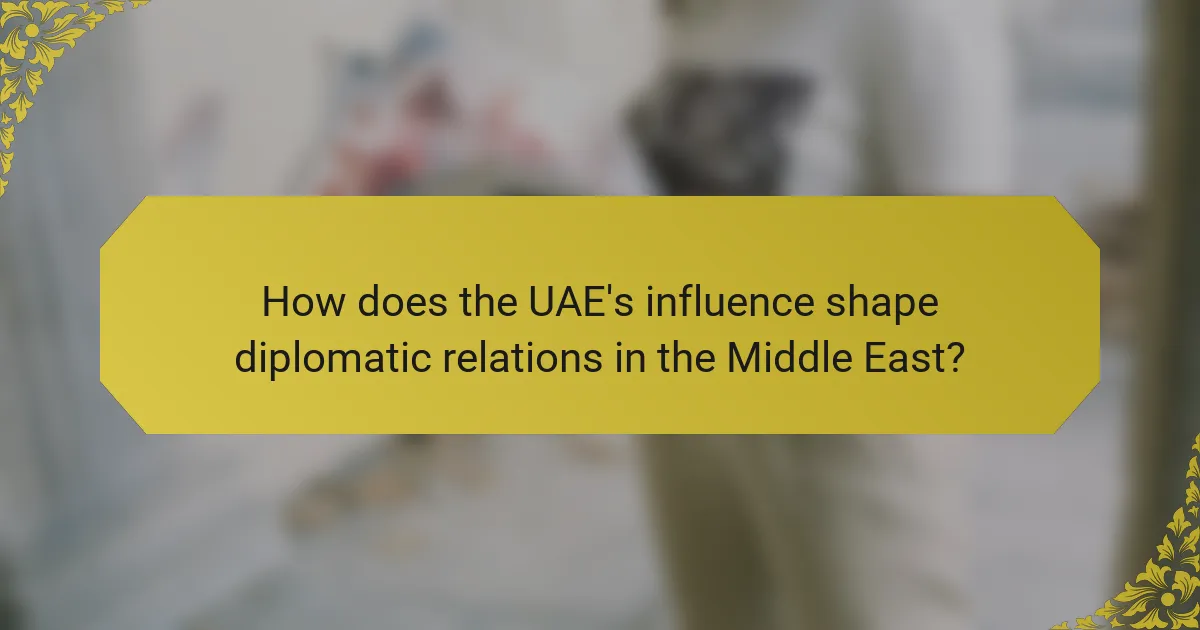
How does the UAE’s influence shape diplomatic relations in the Middle East?
The UAE’s influence shapes diplomatic relations in the Middle East through strategic partnerships and economic initiatives. It actively engages in multilateral diplomacy, fostering ties with various nations. The UAE’s investment in regional infrastructure boosts economic interdependence. This economic leverage enhances its political clout. The UAE also plays a mediating role in conflicts, promoting stability. For example, its involvement in the Yemen conflict underscores its diplomatic reach. Additionally, the UAE’s soft power initiatives, such as cultural exchanges, strengthen bilateral relations. Overall, the UAE’s proactive diplomatic strategies significantly impact regional dynamics.
What are the UAE’s roles in conflict resolution?
The UAE plays a significant role in conflict resolution through diplomatic mediation and humanitarian efforts. It engages in various regional and international conflicts to promote peace and stability. The UAE has facilitated negotiations in conflicts such as the Yemeni civil war and the Sudanese peace process. It collaborates with global organizations like the United Nations to support conflict resolution initiatives. The UAE also provides humanitarian aid to conflict-affected regions, enhancing its diplomatic credibility. Additionally, it invests in developmental projects in post-conflict areas to foster long-term stability. These roles underscore the UAE’s commitment to peace and security in the Middle East.
How has the UAE mediated disputes between regional powers?
The UAE has mediated disputes between regional powers through diplomatic initiatives and hosting negotiations. It has facilitated dialogue between conflicting nations, such as Qatar and Saudi Arabia. The UAE played a crucial role in the 2017 Gulf crisis, advocating for dialogue over conflict. It has also engaged in backchannel communications to reduce tensions. The UAE’s strategic location and economic influence enhance its mediating capacity. Additionally, it has utilized platforms like the Arab League to promote regional stability. The UAE’s efforts have often resulted in temporary resolutions, fostering a climate for ongoing discussions. Its commitment to diplomacy is evident in its consistent engagement with various regional actors.
What diplomatic initiatives has the UAE launched recently?
The UAE has launched several diplomatic initiatives recently. These include efforts to strengthen ties with countries in the Middle East and beyond. The UAE hosted the inaugural Abu Dhabi Sustainability Week, focusing on global climate action. It also signed agreements aimed at enhancing economic cooperation with India and Israel. Additionally, the UAE has engaged in peace negotiations in various regional conflicts. These initiatives demonstrate the UAE’s commitment to fostering stability and collaboration in the region.
What best practices can be learned from the UAE’s approach to economic development and diplomacy?
The UAE’s approach to economic development and diplomacy demonstrates several best practices. First, diversification of the economy has been crucial. The UAE moved beyond oil dependency, investing in sectors like tourism, aviation, and technology. This strategy has led to sustained economic growth, with a GDP growth rate of 2.1% in 2021.
Second, strategic partnerships play a significant role. The UAE has established strong ties with global powers and regional neighbors. These alliances enhance trade and investment opportunities. For instance, the UAE’s trade with India reached $60 billion in 2020.
Third, the UAE emphasizes innovation and technology. Initiatives like the UAE Vision 2021 aim to foster a knowledge-based economy. This focus on innovation has attracted global talent and investment.
Lastly, the UAE’s diplomatic efforts are characterized by proactive engagement. The country actively participates in international organizations and peacekeeping missions. This commitment to diplomacy enhances its global standing and influence.
These best practices highlight the UAE’s effective strategies in economic development and diplomacy.
How can other nations emulate the UAE’s economic strategies?
Nations can emulate the UAE’s economic strategies by diversifying their economies. The UAE has successfully reduced its reliance on oil by investing in sectors like tourism, aviation, and renewable energy. Countries should prioritize infrastructure development to attract foreign investment. The UAE’s free zones offer tax incentives and regulatory advantages, which can be replicated elsewhere. Establishing strong international trade relationships is crucial for economic growth. The UAE has leveraged its strategic location to become a global trade hub. Furthermore, investing in education and innovation fosters a skilled workforce. The UAE has focused on technology and entrepreneurship to drive economic progress. These strategies demonstrate a clear path for other nations to follow.
What lessons can be drawn from the UAE’s diplomatic efforts in the Middle East?
The UAE’s diplomatic efforts in the Middle East highlight the importance of strategic partnerships. These partnerships have enabled the UAE to enhance its influence across the region. A key lesson is the effectiveness of soft power in diplomacy. The UAE has utilized cultural exchanges and economic investments to build relationships. Additionally, the UAE’s proactive approach in conflict resolution has shown the value of mediation. Their involvement in peace agreements, such as the Abraham Accords, illustrates the potential for normalization and cooperation. Furthermore, the UAE’s focus on economic diversification emphasizes the role of economic stability in diplomatic relations. These lessons underscore the significance of adaptability and innovation in foreign policy.
The primary entity of this article is the United Arab Emirates (UAE), which plays a crucial role in Middle Eastern economic development and diplomacy. The article evaluates the UAE’s economic diversification strategies, highlighting its significant GDP, investments in infrastructure, technology, and renewable energy, as well as its position as a regional trade hub. It also examines the UAE’s diplomatic initiatives, including strategic partnerships and conflict mediation efforts, which enhance regional stability and cooperation. Key economic sectors such as oil and gas, tourism, aviation, and finance are discussed, along with the UAE’s influence on foreign investment and economic policies in the region.
